How To Perform Aidiladha Prayer at Home
How to Perform Eid Prayer at Home
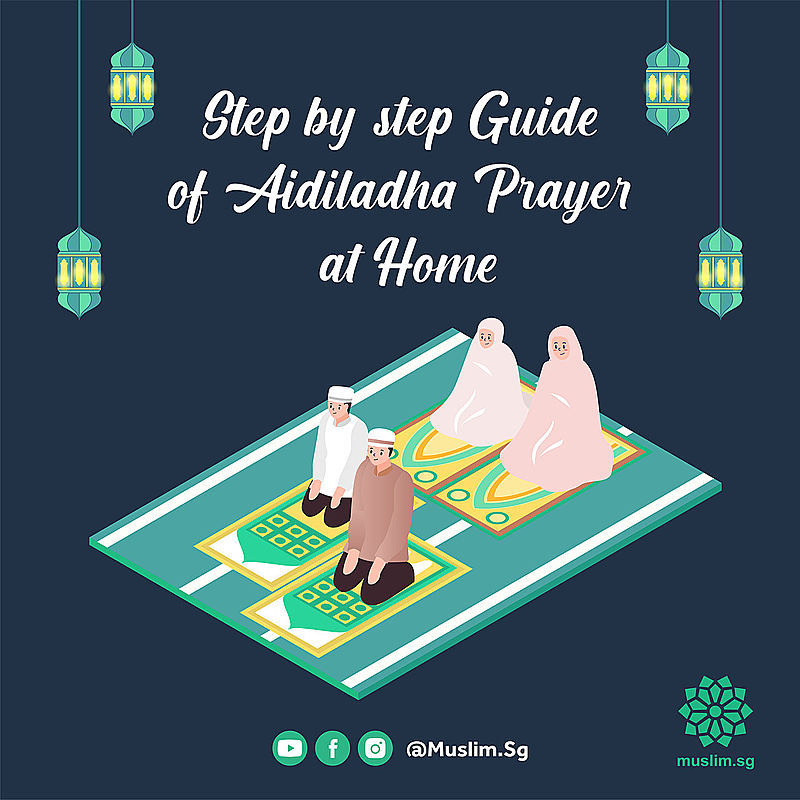
The blessed month of Zulhijjah is a month filled with blessings and rewards, yet it is often overlooked by many. ‘Zulhijjah’, which means ‘the possessor of the month of pilgrimage’, is when Muslims perform the Hajj. However, this does not mean those who do not perform the Hajj are of lesser significance or are not able to achieve the rewards of Zulhijjah.
Read: Hajj: The Meaning of Pilgrimage
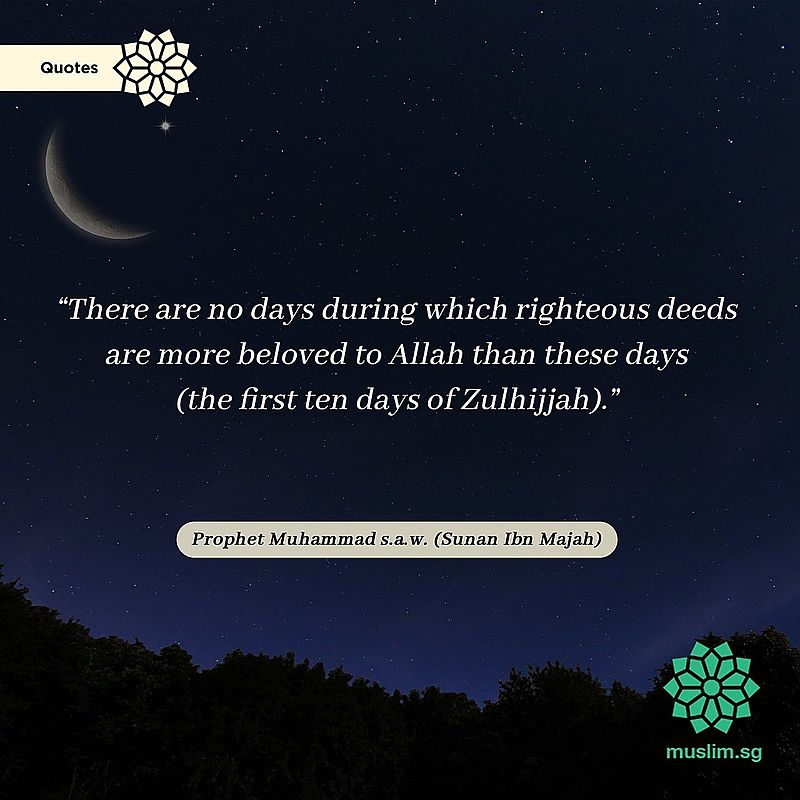
During the first 10 days of Zulhijjah, especially the Day of Arafah, Muslims are encouraged to celebrate with multiple acts of worship such as fasting and observing zikir (remembrance).
Read: The virtues of the first 10 days of Zulhijjah.
On the 10th day, we are not allowed to fast. Instead, we celebrate the completion of the Hajj and the blessed days with the celebration of Hari Raya Aidiladha or Hari Raya Haji. This includes praying our Sunnah prayer of Hari Raya Aidiladha.
Read: The Significance of Hari Raya Aidiladha
The Ruling of The Aidiladha Prayer
Just like the Sunnah Aidilfitri prayer, the Sunnah Aidiladha prayer is also considered to be one of the most highly regarded among other Sunnah Prayers (nawafil). Although it is not Obligatory (wajib), its ruling is highly recommended (sunnah muakkadah).
The period to perform the Aidiladha Sunnah prayer is on the 10th of Zulhijjah when the sun has completely risen about 30 mins after Syuruq, which is around 7:30 am, up to before the time of Zohor prayer.
Prayer Spaces Around Singapore
This year, 68 mosques around Singapore will offer spaces and options for Muslims to perform the Sunnah Aidiladha prayer. Mosques will offer up to 3 sessions and no bookings are required, except for 5 identified mosques:
1. Masjid Al-Mawaddah
2. Masjid Darul Ghufran
3. Masjid Sallim Mattar
4. Masjid Wak Tanjong
5. Masjid Darul Makmur (Temporary prayer space)
Some of you may stay near these mosques but are unable to book a slot. It’s normal to feel upset or disappointed. But Alhamdulillah, you can consider going for the next session without booking.
For more details, read here.
If your circumstances do not allow you to pray at a mosque in the congregation, perhaps you may have a family member to look after at home or a job commitment you need to attend to, you can still enliven the spirit of Hari Raya by performing the Sunnah Aidiladha prayer at home or wherever the situation allows you to.
As mentioned above, you may perform it individually or with your family members up till Zohor prayer time.
Here is a step-by-step guide to performing the Hari Raya Haji prayer:
1. Establish The Intention To Perform Aidiladha Sunnah prayer
Establish the intention for the Aidiladha Sunnah prayer:
أُصَلِّي سُنَّةَ عِيدِ الأَضحَى رَكعَتَين لِلَّهِ تَعَالَى
Usolli sunnata ‘idil adha rak'ataini lillah ta'ala
I intend to pray the Sunnah prayer of Aidiladha, two raka'at, for Allah ta'ala
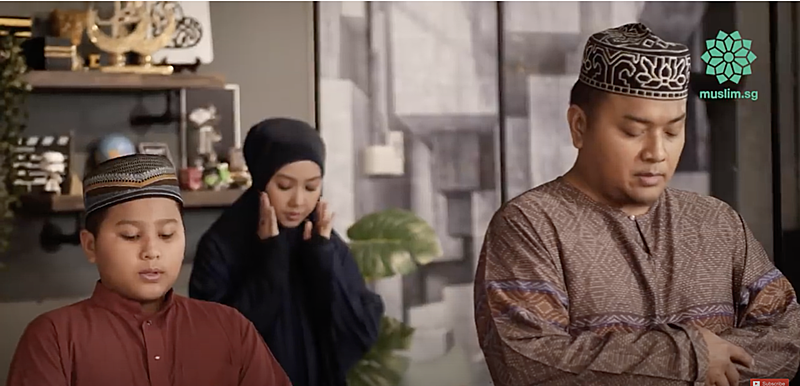
If you are praying in a congregation, the intentions for Aidiladha prayer are as follows.
The one who is leading the prayer as an Imam would recite:
أُصَلِّي سُنَّةَ عِيدِ الأَضحَى رَكعَتَين إِمَامًا لِلَّهِ تَعَالَى
Usolli sunnata ‘idil adha rak'ataini imaman lillah ta'ala
I intend to pray the Sunnah prayer of Aidiladha, as the Imam, two raka'at, for Allah ta'ala
The Ma’mum (follower) will recite this intention:
أُصَلِّي سُنَّةَ عِيدِ الأَضحَى رَكعَتَين مَأمُومًا لِلَّهِ تَعَالَى
Usolli sunnata ‘idil adha rak'ataini ma’muman lillah ta'ala
I intend to pray the Sunnah prayer of Aidiladha, as the Ma’mum (follower), two raka'at, for Allah ta'ala
Read: 5 Benefits of Congregational Prayers in Islam
The following illustrations will guide you in praying in Jema’ah (in a congregation) at home:
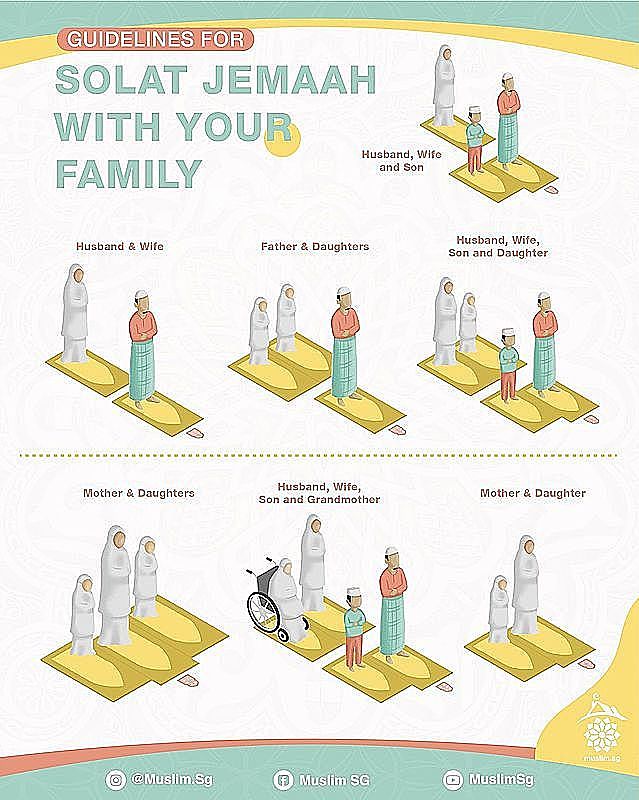
Read: How to Pray in Congregation at Home
2. Perform The Takbiratul Ihram

Takbiratul ihram is the act of raising your hands such that your thumbs are around the same level as your earlobes and your palms are on the same level as your shoulder.
With the intention present in mind, say ‘Allahu Akbar’.
3. Place Your Right Hand Over Your Left and Recite Dua Iftitah
Upon giving the takbir, lower your hands gently below your chest area and put your right hand over your left.
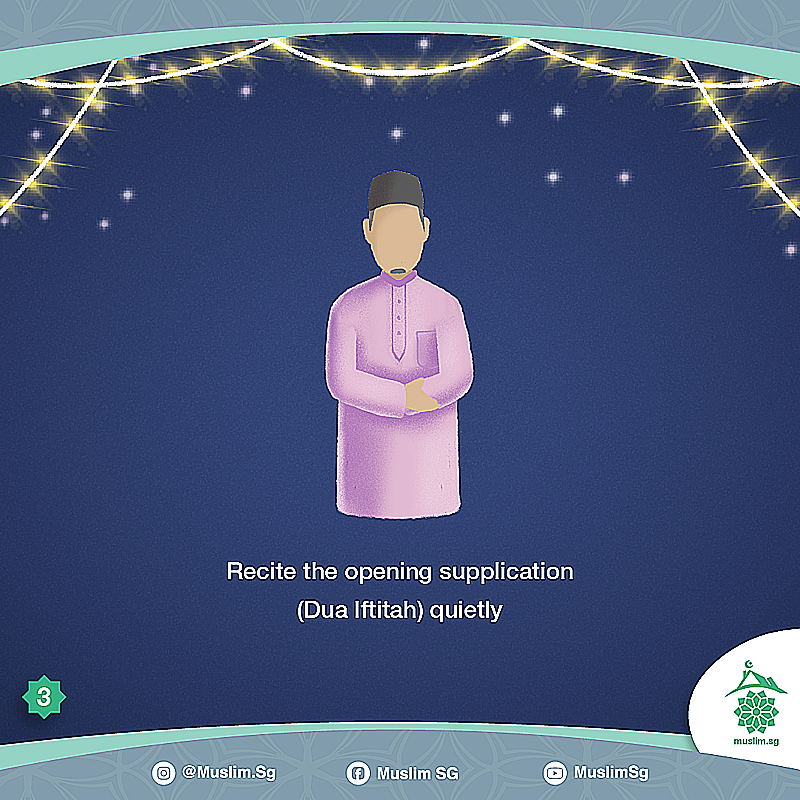
Recite the Dua Iftitah (opening dua) quietly only for the first raka’at:
اللهُ اَكْبَرُ كَبِرًا وَالْحَمْدُ لِلهِ كَثِيرًا وَسُبْحَانَ اللهِ بُكْرَةً وَأَصِيْلًا. وَجَّهْتُ وَجْهِيَ لِلَّذِيْ فَطَرَالسَّمَاوَاتِ وَالْأَرْضَ حَنِيْفًا مُسْلِمًا وَمَا أَنَا مِنَ الْمُشْرِكِيْنَ. إِنَّ صَلَاتِيْ وَنُسُكِيْ وَمَحْيَايَ وَمَمَاتِيْ لِلَّهِ رَبِّ الْعَالَمِيْنَ. لاَ شَرِيْكَ لَهُ وَبِذَلِكَ أُمِرْتُ وَأَنَا مِنَ الْمُسْلِمِيْنَ
Allahu Akbar kabira,
Walhamdulillāhi kathira
Wa subhanallahi bukratan wa asila
Wajjahtu wajhiy-allazi fataras-samawati wal-ardh
Hanifan Musliman wama ana minal-musyrikin
Inna salati, wa-nusuki wa-mahyaya, wa-mamati Lillahi Rabbil-'alamin
La syarika lahu wa bizalika umirtu wa ana minal Muslimin
___________________
Allah the Almighty, the Greatest
All praises be upon Him
Allah The Most Exalted of them all, day and night
I stand before The One Who created the skies and the lands
I sincerely submit to Allah and I am certainly not among those who associate Allah with other beings
Indeed my Solat, my good deeds, my life and my death are all for Allah The Lord of all the worlds
He has no partner nor parallel whatsoever, and I have been ordered as such, and I am from those who embrace Islam.
4. Give 7x Takbir
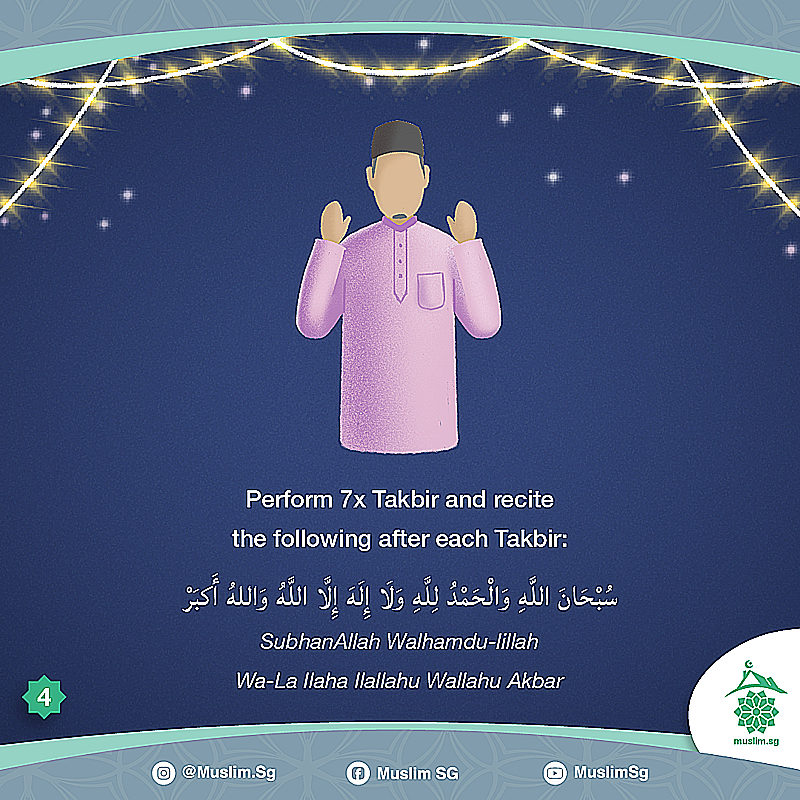
After reciting the opening prayer (Dua Ifititah), perform another takbir 7x. Put your hands back on your chest after every takbir as per the default standing position in prayer.
It is part of the sunnah to recite the following in between each takbir quietly, including after the 7th takbir:
سُبْحَانَ اللَّهِ وَالْحَمْدُ لِلَّهِ وَلَا إِلَهَ إِلَّا اللَّهُ وَاللهُ أَكبَر
SubhanAllah walhamdulillah wa la ilaha llAllahu wAllahu Akbar
If one were to become confused about the number of takbir recited - for example, reciting 8 takbir instead of 7 takbir, then it is okay. It is considered makruh (disliked), but the prayer is still valid.
If you were to jumble up the number of takbir recited by mistake and the number remains unclear for you, take the smallest number in mind and continue from there.
Or if you were to mistakenly skip all the 7 takbir and recite Surah Al-Fatihah immediately after the opening prayer (Dua Iftitah), it is okay to proceed with the prayer as it does not invalidate the Sunnah Aidiladha prayer itself. Leaving the 7 takbir unintentionally, however, is makruh (disliked).
On another note, it is also important to clarify that the mentioned 7 takbir does not include the Takbiratul Ihram (Opening Takbir). So after the Takbiratul Ihram, do another 7 takbir.
5. Recite Surah Al-Fatihah
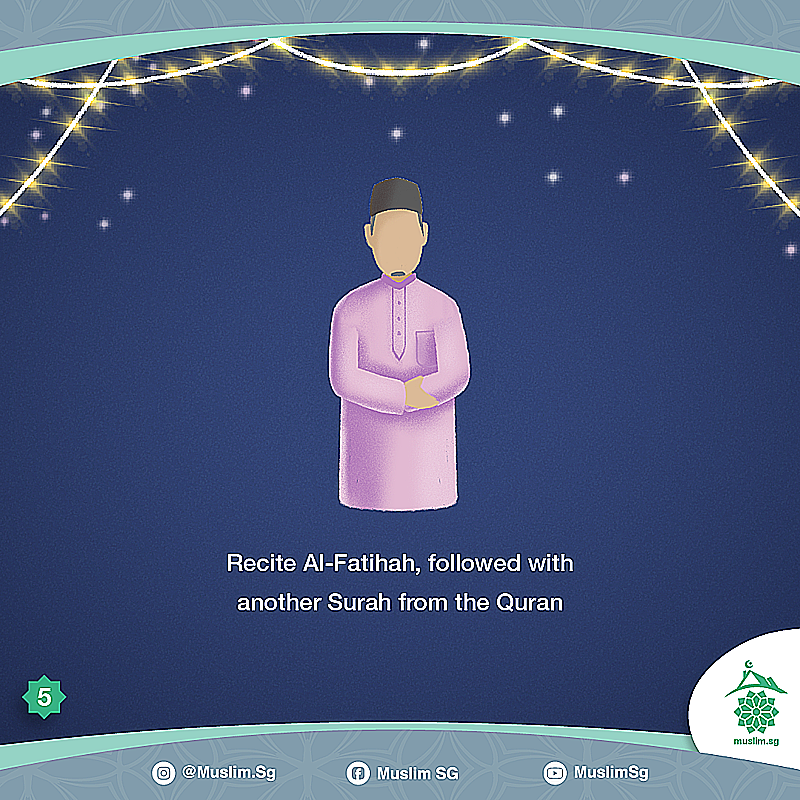
Once all the 7 takbir have been made, recite the Ta’awwudz (seeking refuge in Allah s.w.t):
أَعُوذُ بِاللَّهِ مِنْ الشَّيْطَانِ الرَّجِيمِ
A`udhu billahi min-ash-shaytanir-rajim
I seek refuge with Allah from the accursed Shaytan
And then read Surah Al-Fatihah:
بِسمِ اللَّهِ الرَّحمٰنِ الرَّحيمِ. الحَمدُ لِلَّهِ رَبِّ العالَمينَ. الرَّحمٰنِ الرَّحيمِ. مَالِكِ يَومِ الدّينِ. إِيّاكَ نَعبُدُ وَإِيّاكَ نَستَعينُ. اهدِنَا الصِّراطَ المُستَقيمَ. صِرَاطَ الَّذِينَ أَنعَمْتَ عَلَيهِم غَيرِ المَغضُوبِ عَلَيهِم وَلَا الضَّالِّينَ
Bismillahir-Rahmanir-Rahim
Alhamdu lillahi Rabbil-ʿalamin
Ar-Rahmanir-Rahim
Maliki yawmid-din
iyyaka naʿbudu wa-iyyaka nastaʿin
Ihdinas-siratal-mustaqim
Siratallazhina anʿamta ʿalayhim ghayril-maghdubi ʿalayhim wa-laddallin
___________________
In the name of God, The Most Compassionate, The Most Merciful.
Praise be to God, Lord of all the worlds.
The Compassionate, the Merciful. Ruler on the Day of Reckoning.
You alone do we worship, and You alone do we ask for help.
Guide us on the straight path,
the path of those who have received your grace;
not the path of those who have brought down wrath, nor of those who wander astray.
Amin.
Upon completing the recitation of Surah Al-Fatihah, you may read any other memorised surah or verse of your preference from the Quran.
For the second raka’at, it is encouraged to choose a verse that does not precede the first in the order of the Quran. For example, you can read Surah Al-’Asr in the first raka’at and read Surah Al-Ikhlas in the second.
6. Complete The First Raka'at

Bend Forward for Ruku’
Say Allahu Akbar (takbir) during the transition from standing to bending for ruku’, while raising your hands just as previously explained. Lower your hands gently to your knees as you move towards the ruku’ position.
Say three times,
سُبْحَانَ رَبِّي العَظِيمِ وَبِحَمْدِهِ
Subhanna Rabbiyal-’azimi wa bihamdih
Glory be to Allah, the Mighty, and praise be to He
Stand in the upright position - I’tidal
After completing the ruku’ position, return to the standing position while raising your hands just as in the Takbir position and recite during the transition:
سَمِعَ اللهُ لِمَنْ حَمِدَهُ
Sami’-Allahu liman hamidah
Allah has heard the one who praised Him
Lower your hands gently to your sides. When you are in the complete upright position, recite:
رَبَّنَا وَلَكَ الْحَمْدُ
Rabbana walakal-hamd
O Our Lord, to You are all the praises
Perform the first sujud
Go into prostration while saying the Allahu Akbar. Let your knees touch the ground first, followed by your palms and then your forehead. While in the first Sujud, recite three times:
سُبْحَانَ رَبِّي الأَعْلَى وَبِحَمْدِهِ
Subhanna Rabbiyal-a’la wa bihamdih
Glory be to my Lord The Most High, and praise be to He
Sit on your knees
In between the two Sujud, rise from the prostration to a sitting position on your knees while saying Allahu Akbar. In the sitting position, say :
رَبِّ اغْفِرْ لِيْ وَارْحَمْنِيْ وَاجْبُرْنِيْ وَارْفَعْنِيْ وَارْزُقْنِيْ وَاهْدِنِيْ وَعَافِنِيْ وَاعْفُ عَنِّيْ
Rabbighfirli wa-rhamni wa-jburni wa-rfa’ni wa-rzuqni wa-hdini wa ‘afini wa’fu ‘anni
O Lord, forgive me, have mercy on me, cover for me my shortcomings, elevate my rank, provide for me, guide me, grant me well-being, and pardon me
Perform the second sujud
Afterwards, return to the prostration position to complete the second Sujud and repeat the recitation as mentioned previously.
Upon fulfilling the mentioned steps, you have completed the first raka’at.
7. Return to the standing position - Give 5x Takbir
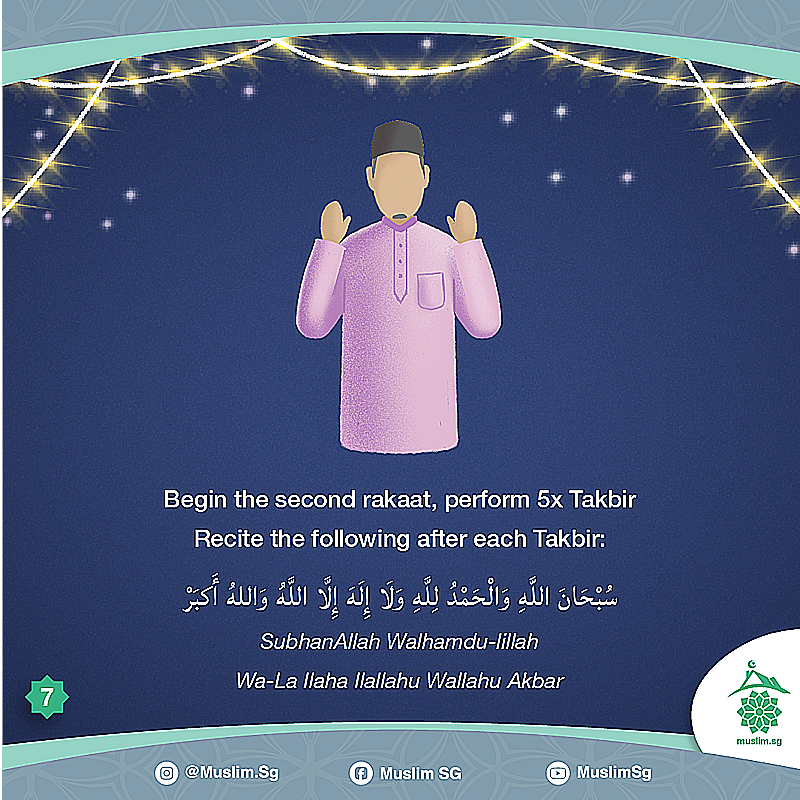
Return to the standing position while saying Allahu Akbar (takbir). Begin the second raka’at with another 5x takbir just as explained in step No. 4. In between each takbir, recite:
سُبْحَانَ اللَّهِ وَالْحَمْدُ لِلَّهِ وَلَا إِلَهَ إِلَّا اللَّهُ وَاللهُ أَكبَر
SubhanAllah Walhamdu-lillah Wa-La Ilaha Ilallahu Wallahu Akbar
8. Recite Surah Al-Fatihah
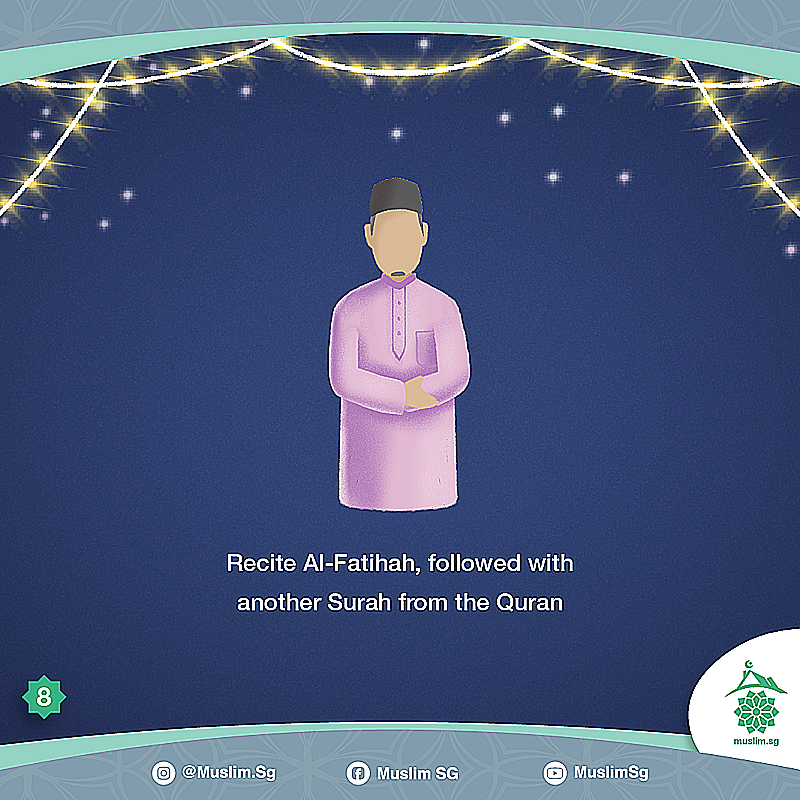
Follow step No. 5.
9. Complete The Second Raka'at
After reciting Surah Al-Fatihah and then followed by another Surah from the Quran, repeat the steps mentioned in step No. 6 to complete the second raka'at.
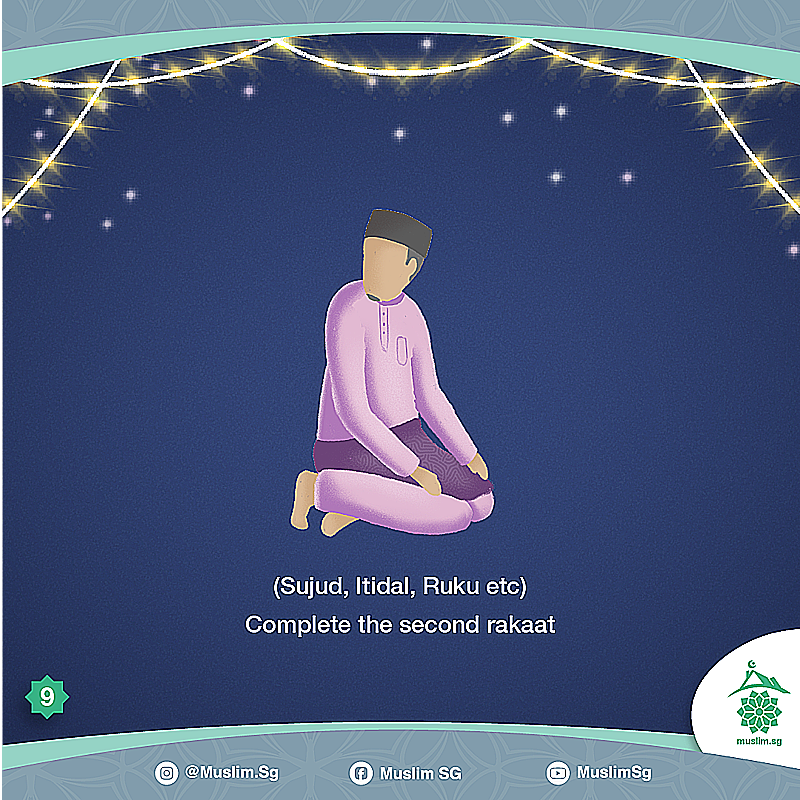
10. Recite The Final Tasyahhud
Complete the prayer by reciting the final Tasyahhud:
اَلتَّحِيَّاتُ الْمُبَارَكَاتُ الصَّلَوَاتُ الطَّيِّبَاتُ ِللهِ. اَلسَّلاَمُ عَلَيْكَ أَيُّهَا النَّبِيُّ وَرَحْمَةُ اللهِ وَبَرَكَاتُهُ. اَلسَّلاَمُ عَلَيْنَا وَعَلَى عِبَادِ اللهِ الصَّالِحِيْنَ
At-tahiyyatul mubarakatus-salawatut-tayyibatu lillah. Assalamu ‘alaika ayyuhan-nabiyyu wa rahmatullahi wa barakatuh. Assalamu ‘alaina wa ‘ala ‘ibadillahis-salihin
Raise your right index finger and say:
أَشْهدُ اَنْ لاَ إِلَهَ إِلاَّ اللهُ وَاَشْهَدُ أَنَّ مُحَمَّدًا رَسُوْلُ اللهِ
Asyhadu an la ilaha illAllah, wa asyhadu anna Muhammadar-rasuulullah
Continue with the selawat:
اللَّهُمَّ صَلِّ عَلَى مُحَمَّدٍ وَعَلَى آلِ مُحَمَّدٍ كَمَا صَلَّيْتَ عَلَى آلِ إِبْرَاهِيمَ إِنَّكَ حَمِيدٌ مَجِيدٌ، اللَّهُمَّ بَارِكْ علَى مُحَمَّدٍ وَعَلَى آلِ مُحَمَّدٍ كَمَا بَارَكْتَ عَلَى آلِ إِبْرَاهِيمَ إِنَّكَ حَمِيدٌ مَجِيدٌ
Allahumma salli 'ala Muhammad, wa 'ala ali Muhammad, kama sallaita 'ala 'ali Ibrahima, innaka Hamidun Majid. Allahumma barik 'ala Muhammad, wa 'ala ali Muhammad, kama barakta 'ala ali Ibrahima, innaka Hamidun Majid
O Allah, bestow your blessings upon Muhammad and the family of Muhammad as you bestowed your blessings upon the family of Ibrahim. Indeed You are Praised and Glorious. O Allah, bless Muhammad and the family of Muhammad as You have blessed the family of Ibrahim. Indeed You are Praised and Glorious
End with the Salam
Turn your head to both of your sides, starting from the right, such that your cheek can be seen by anyone behind, and say
السَّلَامُ عَلَيكُم وَرَحْمَةُ اللهِ
Assalamu ‘alaykum wa-rahmatullah
Peace and Allah’s mercy be upon you
10. Listen to the Aidiladha Khutbah
Unlike the Friday prayers, the Khutbah (sermon) after the prayer is not part of the integrals (rukun) of the Aidiladha prayer. It is considered to be a sunnah (encouraged) in performing the Aidiladha prayer in a congregation only. Hence, you are not required to deliver the khutbah at home.
With its highly regarded merit in the sight of Allah s.w.t. and the joyous spirit of Aidiladha, we pray that all our humble deeds and sacrifices will be accepted by Allah s.w.t.
And Allah knows best.

